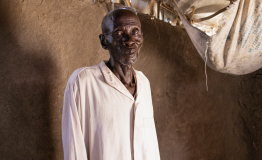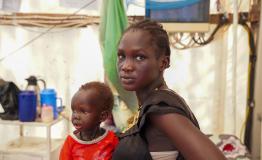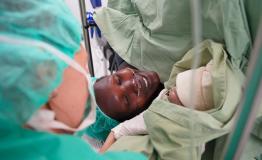I am John Asema. I’m currently part of the Médecins Sans Frontières/Doctors without Borders (MSF) team in South Sudan, but originally I’m from Benue, in northern Nigeria.
Escalating armed conflicts in Benue have meant large numbers of people had to flee their homes and livelihoods to find safety, and are now living in dire circumstances.
Having been born an internally displaced person and grown up in this kind of environment myself, I was deeply inspired by MSF’s work in my hometown, and felt passionately about having a positive impact for people who needed access to humanitarian aid.
I got my first role with MSF in Benue, and now five years later, I’m currently part of an international team working in Bentiu, South Sudan.
Bentiu Internally Displaced People (IDP) Camp
Like my own family, many of the people living in Bentiu have escaped a crisis zone. The camp here hosts almost 100,000 displaced people. But the enduring sub-par living conditions persistently expose them to ongoing health risks, including diseases such as diarrhoea, hepatitis E, malaria, cholera, measles and typhoid fever.
The camp has been here for ten years (since December 2013), but these health issues afflict the community year after year due to the lack of improvements in living conditions. This creates a continuous demand for critical care services that keeps MSF fully occupied and operational 24/7.
Community engagement
With such high levels of need, having strong links with the community we serve is vital.
I’m the community engagement and health promotion manager here, and my job is about enabling and supporting community-driven initiatives that, in turn, help to improve people’s health.
Our team also strives to enhance the community's knowledge, skills, and connections around health, contributing to a people-centred approach that addresses the community's specific needs.
One recent example that has made a profound impact here is the issue of blood.
Blood needs
In Bentiu, whenever someone is badly injured, or a malaria makes a child dangerously anaemic, or a mother haemorrhages after giving birth, the MSF hospital is often the only place that can help. MSF is the only provider of higher-level health services in the camp, and while we can ship in many different medical supplies, blood needs to be sourced via donations, provided locally and consistently.
However, finding blood donors can be an issue for health systems around the world, and Bentiu is no exception. Without access to accurate information, misconceptions about blood donation often circulate, such as the idea that donated blood is sold or sent abroad, that the body does not replenish donated blood, and that only family members can donate, with reluctance to give blood to in-laws. To address the challenge, we turned to the community.
The campaign
To kick things off, we held meetings with local leaders, religious figures, local schools, key community groups, and other influential figures. Through our conversations, we’d realised we needed to encourage people to donate in a way that felt personally significant to them, and the support of these leaders was going to be key.
The Health Promotion team worked closely with existing community groups to organise a series of events, designed not only as blood drives but also to honour people who already who give blood, and who are making a difference in the community in various ways. These donors included community leaders, teachers, community members, and more.
In both approaches, we emphasised the importance of the involvement of people in the community, not just as blood donors but also as individuals who could inspire others to donate.
World Blood Donor Day
The campaign culminated with a vibrant and engaging celebration for World Blood Donor Day. Our event featured inspiring testimonials from donors, moving stories from blood recipients, the presentation of gifts for long-standing donors, and a compelling dramatization by the health promotion team.
The day was brimming with activities, but the pivotal moment was when the leader of the community delivered his speech. Not only did he address misconceptions about blood donation and the importance of volunteering, but he and his officials then set a remarkable example by being the first to donate blood.
This act of leadership inspired others to step forward, and the turnout of volunteers exceeded our initial expectations. We had so many willing donors that some even had to be scheduled for future hospital visits to donate.
The impact
The results were astounding. Not only did we have enough donations to keep the hospital blood bank stocked for six months, ensuring vital patient care, but the campaign also helped to nurture a culture of giving, unity, and pride within the community. People told us they felt more conscious of their role in healthcare and the life-saving impact they can have.
This is what I find so fulfilling about working in community engagement.
Each day, I have the privilege of working closely with diverse groups, joining forces to create a healthier, happier, and more empowered society here.



